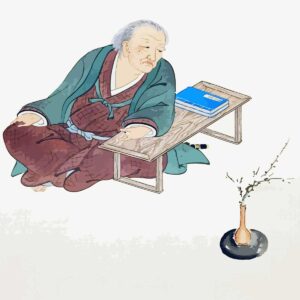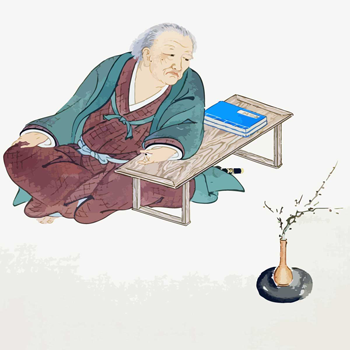
Tea master. Born in 1613, he was one of the Four Heavenly Kings of Sodan and the founder of the Youken school. Born in 1613, his name was Masanao, and later Tonoaki, also known as Genbei, and he went by the stage names Antikoan and Bioan. He was the adopted son of a wealthy draper in Kyoto. His grandfather was Kuda Gyobu Sanbou from Omi (Shiga Prefecture), and his wife is said to have been a sister of Rikyu. Yōken initially studied the tea ceremony in the style of Oribe and Enshu, but later became a student of Sōtan, and it is said that Yōken was the only one who received the secret of Tadako. He was the only one who received the secret of Tadako from Sotan. He also received the tea ceremony of incense burner from Rikyu from Miyake Banyo. In addition to tea ceremony, he was also a connoisseur of flower arrangement, and was especially fond of literature. He was a great poet of Chinese poetry, and later edited “Youken Shishu” (“Poetic Anthology of Youken”). He had many masterpieces in the family collection, and also made incense containers, jujubes, bamboo vases, and tea scoops, etc., with his own taste, and his life inscriptions are rich in learning and wit. His eldest son Shoken and second son Shoin both succeeded their father in the tea ceremony. Shoin’s book “Chado kokubunroku” (Record of old stories about the tea ceremony) is largely copied from his father’s writings. Later, Kubofugo-an’s “Chado Mangetsu-shu” is known as a tea ceremony book in the style of Yoken. His disciples included Ogata Kenzan, Kusumi Morikage, Kusumi Soyasu, Hikita Munezumi, and Kitamura Yuan, and Kondo Ryuka was assigned as the tea master of the Ise Toudou clan, with whom he had a special relationship through a kimono mission. In his later years, he created the famous Yodogan (Yodogan’s seat) at Seioin Temple in Kurodani (Sakyo Ward), which was formerly known as Shikumoan (Purple Cloud Hermitage).



